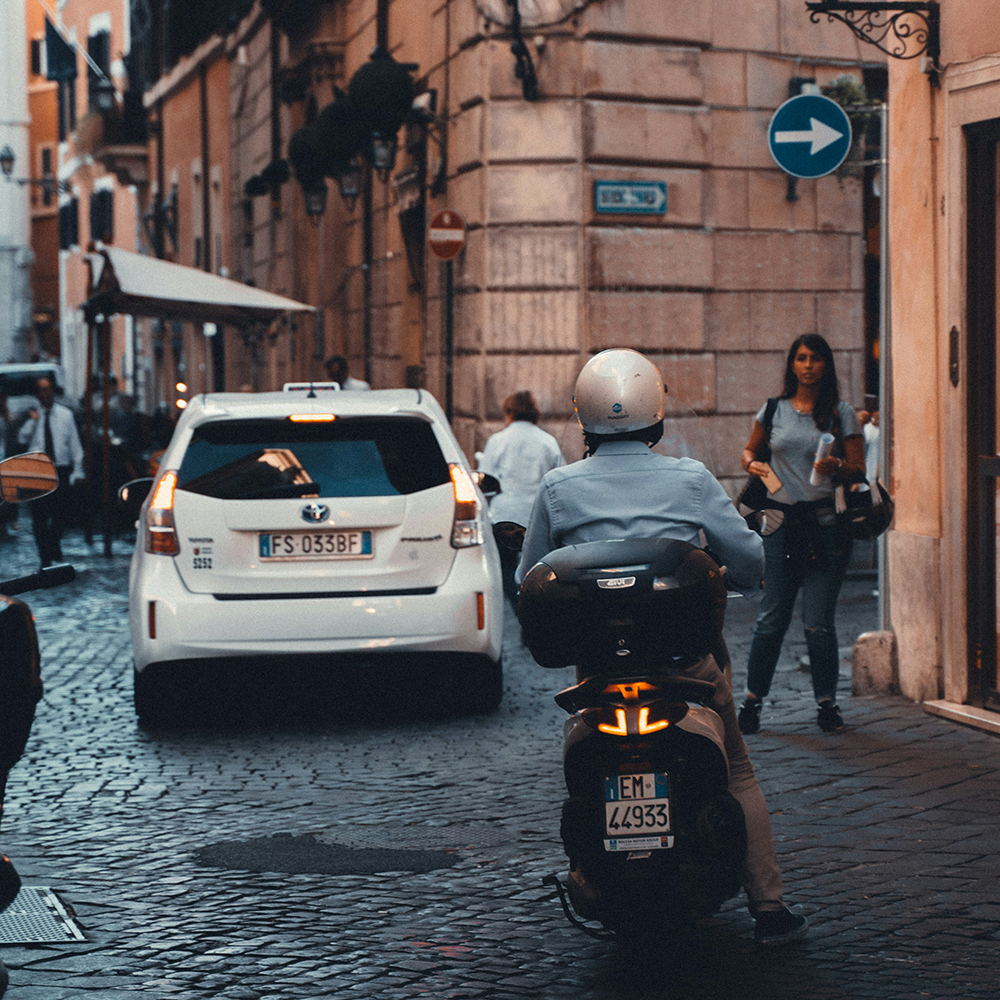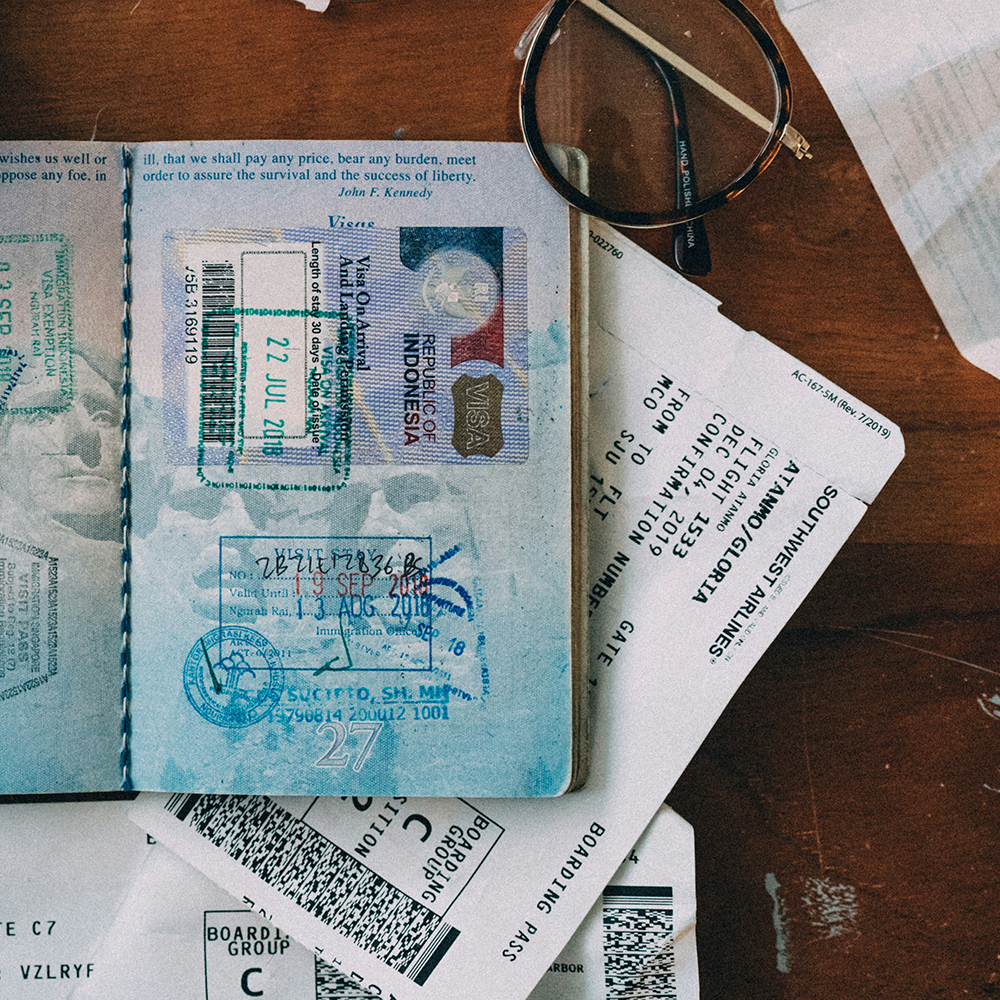A backpacker's guide to confronting what intimidates you
Backpacking appears incredibly freeing at first. You squish all your minimal belongings into a pack, book wildly exciting adventures, board a flight, and you're off! A feeling of ease comes from having few responsibilities, and an open journey lying ahead.
For long-term backpacking trips, you head into a period not consumed by work, alarms, cleaning and all the daily actions that keep life flowing. That’s fine and dandy until you quickly realize the new stresses that accompany this roaming traveller lifestyle.
I had the biggest smile on my face when I stepped on the plane to Rome from Vancouver for my first solo backpacking trip. Upon landing, my grin faded and my throat became dry. As I exited the airport, a line of taxi drivers yelling in a language I couldn’t understand made my heartbeat quicken. The crowds of people walking with confidence made me realize I lacked it.
From communicating in a foreign language, managing tight budgets, dating and meeting new people, backpacking will push you outside your comfort zone. That can be… intimidating to say the least. To navigate that, here is some advice on managing the inevitable stressors and finding comfort in the unknown.
Trust locals over online reviews
Part of the intimidation can come from the overwhelm of wanting to do everything right to maximize your experience. It’s only natural to research a place before you arrive, maybe pin a few spots on Google Maps and imagine how your days will unfold. But you can’t rely on the online reviews to be reality. The “best restaurant” you read about may be closed the day you planned to go, or the beach you wanted to visit might be farther than you thought. It's good to observe what the locals are doing in these moments. Take your eyes off your phone, notice which restaurants are full of people, and go there instead.
In Naples, instead of going to the famous pizzeria featured in Eat, Pray, Love, I met some young people vacationing from Rome on the beach who guided me to a small joint on a side street. The place had four tables full of older Italian women and families. The pizza was simple, delicious and cost only three euros. Plus, it paired perfectly with the large Peronis everyone was drinking. Locals will have a far better understanding of how to enjoy the new place where you find yourself. Moral of the story: Don’t waste energy trying to curate experiences exactly as you saw online.
Skip eating out to save money
Backpacking often means that you’re travelling the world with minimal belongings and an even smaller budget. Money can be stressful, and sticking to a budget can definitely add to that traveller panic most of us feel at one point or another. To solve that problem, I’m suggesting scrapping eating out (either most of the time or altogether).
While going to restaurants is a great way to experience a new culture, not doing so doesn’t have to lessen the experience. Eating cheaply is easy and takes restaurant bills off your mind. A tight budget means you need to be intentional about what your money goes towards. Sometimes that means eating a packed sandwich in the park while people-watching. Plus, most hostels have communal kitchens and dining areas, and grocery stores are perfect for trying new foods or practicing a language.
When I arrived in Rome, I knew most restaurants in my neighbourhood would be outside my budget. So, I headed to the grocery store to get a loaf of bread and peanut butter. It didn’t take me long to learn my first Italian custom: peanut butter is not the thing… but Nutella and jam is adored by locals!
A few days later, on a train heading south, I was dipping bread into my jar of jam (sorry, no plates... it's a backpacker thing), as I watched the rolling green countryside slip by. A girl across from me laughed and asked me a question in Italian. “Sorry,” I replied, "I don't understand.” She switched to English, saying, “I thought you were Italian because of what you’re eating!” That short interaction led to a larger conversation.
Use online chats and scheduled activities to fight social anxiety
New places mean new people. That can be intimidating, but it doesn’t have to be. Social anxiety is common when backpacking, and that makes sense: you’re in environments with people from different places, who speak different languages, and who have different cultures and sets of social norms. Socializing under these circumstances can cause anxiety, but it's also one of the best parts of backpacking! Shared experiences abroad have a different level of beauty, and having friends across the globe is a rare gift.
If you’re more introverted, pushing yourself to be social gets easier over time. Plus, backpacking in 2025 means hostels often have a group chat, allowing you to introduce yourself and make plans. Additionally, many have happy hours or walking tours that remove the burden of making the first move. You can also use apps like Meetup with scheduled activities worldwide. Use these digital perks to your advantage and break the ice by signing up for an activity or responding to someone's invite in a chat. (Another benefit is being able to scope out their profile to get a gut feel.)
Somehow, I ended up in the small city of Alicante, Spain, for a weekend getaway from Madrid. Alone and with no plans, I was content lying on the beach, but by nightfall, I felt a bit sad that I had no one to hang out with. I opened the hostel group chat to see a message inviting people to watch the sunset. I scoped out their profile and replied. Ten minutes later, we met at my hostel (a public safe meeting spot) and spent the evening watching the oranges and pinks fade behind the ocean. Turns out they were from my home city, and six months later, we were in Toronto hanging out again.
Keep your important documents organized and read the fine print
The actual travel part of backpacking (the flights, border crossings, airports, train stations, bus schedules, etc.) can be daunting. So many times to remember. So many details to keep in mind. So much information to stay on top of. You’ll likely accumulate many tickets and boarding passes. While you may think it’s fine to leave the tickets in your email, that can lead to a stressful scrolling and searching through an inbox that should have been cleared years ago (I’m guilty of this). Instead, download tickets and put them in separate folders on your phone, titling them with the locations and dates so that they’re easy to find. This helps you avoid losing them and saves you when service is unavailable.
Additionally, take a minute to read the conditions and fine print. In Agadir, Morocco, I’d spent a week surfing and enjoying tagine on the beach. I spent my departure day saying bye to the many local cats and walking near the ocean. Luckily, as I was packing my bag, I pulled up my boarding pass in my email and discovered I needed a printed version. In 2024, this surprised me! Thankfully, my hostel had a printer, and I got one in the nick of time.
Use technology to help you communicate in new languages
I’ll preface this point by saying that I recommend learning a few key phrases in the local language before arrival. This helps you feel more comfortable and shows respect to locals. That said, it’s not always possible to be fluent in the local language everywhere you go. It’s normal for language barriers to feel stressful or daunting. That’s where language apps like Google Translate (which has a talk-to-text feature) and DeepL (my personal favourite) come in.
People often get flustered with new languages. Don’t be afraid to slow down, take a breath and grab your phone to help you translate. Perhaps you simply want to express gratitude, ask for a recommendation, or iron out travel logistics. In Peru, I decided to leave Lima and spend a few days in the nearby coastal town of Paracas before my departure. Little did I know, there was an upcoming bus strike on the day of my return, with no way to change my tickets online. At the bus headquarters, I slowly made my way through a conversation explaining my situation. I managed to sort it out, thanks to apps, body language, and my limited Spanish.
+ + +
As I said at the beginning, backpacking can seem incredibly freeing—and it is. Sure, there are intimidating elements to overcome, like social anxiety, travel logistics, language barriers, and limited cash, but once you get outside of your comfort zone and realize how capable you are, that’s when the adventures really begin. Travelling is filled with so many smells, noises, textures, and emotions. I still remember the taste of salt in my mouth and the feeling of dried sunscreen on my face when in Morocco. I can picture the way the stars stood still in the mountains of Peru. You’ll overcome the challenges and with time, forget all about what used to intimidate you as the magic of travel overtakes.





